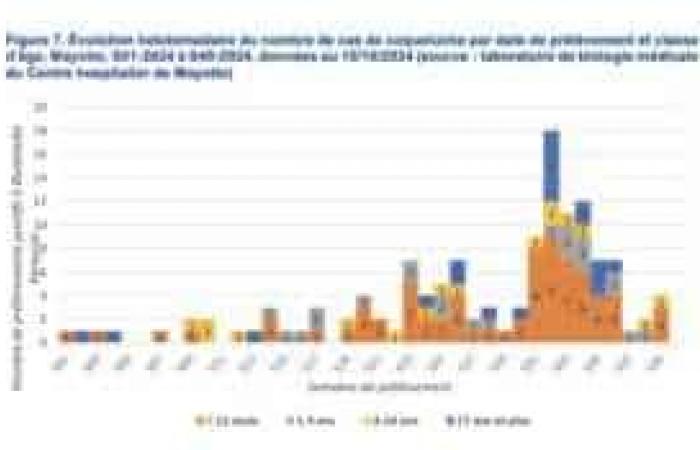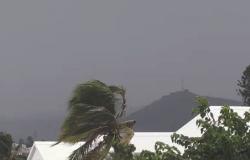
For the choleraRAS, nothing to report, indicates the Public Health France bulletin, confirming the previous press release on the subject. The last case of cholera detected in Mayotte dates from July 12, an imported case.
The positivity rate of Acute gastroenteritis (GEA) was on the rise two weeks ago, with a positivity rate of 30%. SPF says the peak was reached in mid-October last year. Although sales of anti-diarrheals had increased over the previous four weeks, they showed a decline in early October, “while still being above the maximum of the last 6 years.”
If no case ofAcute respiratory infections (IRA) had not been identified since the end of July, two positive samples for respiratory syncytial virus (RSV) were declared at the end of September, “could herald the start of an epidemic in the weeks to come”, which would correspond to the seasonality of this disease in previous years.
No serious case of RSV bronchiolitis has been declared by the intensive care units of the Mayotte hospital center in recent weeks. As for the Covid, since the start of the year, positive samples have been recorded “sporadically”. The positivity rate remains low.
The Whooping cough was deadly since two children under 1 year old died. Since the start of 2024, 131 cases of whooping cough have been identified compared to only 16 cases in 2023. “We are observing an increase in positive samples,” indicates SPF, with a peak occurring at the beginning of August with 18 cases. 55% of cases were children under 1 year old. Since the end of 2023, an increase in cases of whooping cough has been confirmed in Europe, with an acceleration in early 2024.
Prevention is based on vaccination with three complementary strategies: obligatory for infants, strongly recommended for pregnant women, otherwise postpartum and for those close to the newborn/infant.
After 3 cases imported from dengue detected at the start of the year, a 1is indigenous case had been recorded, but the number of cases is falling again. Since the start of the year, 82 cases of dengue fever have been recorded, including 63 in Petite-Terre, which represents a rate of 77%. The median age of cases was 37 years.
Two diseases are in the news, “Chik” and Monkeypox. The first is not reported in Mayotte, but in Reunion where since August 23, 9 cases of Chikungunya have been confirmed. “The health authorities of Reunion Island reacted quickly by carrying out vector control actions and informing health professionals to improve the detection of suspected cases.” No worries for this late southern winter, but the first rains will encourage the proliferation of mosquitoes and therefore the risk of transmission. Rapid detection by PCR and prevention “are essential to avoid the establishment of lasting autochthonous transmission”.
As for monkeypox or monkeypox, no cases had been reported in Mayotte as of October 10. This rare viral infectious disease caused by the virus Monkeypox (Mpox), transmitted mainly by rodents to humans, then from person to person by droplet or close contact, presents symptoms comparable to those of smallpox. To date, no contamination has been recorded in France, but given the current alert, surveillance of these infections has been reinforced by Public Health France.
Note that, due to the crisis experienced by the Mayotte Emergency Department, the indicators are not 100% reliable, “while waiting to be able to analyze this data, they are no longer presented”, indicates SPF .
A.P-L.





